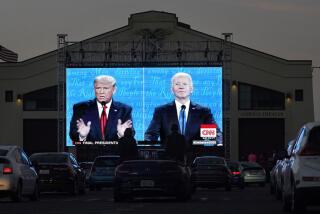McManus: Slugging it out with Gingrich
- Share via
The Romney camp is worried.
By this point in the Republican presidential campaign, Mitt Romney’s backers had hoped that conservative voters would be coalescing around the former Massachusetts governor as the inevitable nominee.
But that’s not happening. The disappointed partisans of Michele Bachmann, Rick Perry and Herman Cain haven’t flocked to Romney; they haven’t even trickled. Instead, Romney’s support in national polls declined over the last month. In many surveys, there’s a new front-runner: Newt Gingrich, whose candidacy once looked so moribund that his staff left in droves and he took off for a vacation in the Greek islands.
Now, Romney and his aides are having to contemplate nightmare scenarios: A Gingrich upset in New Hampshire, a Gingrich victory in South Carolina, a Gingrich endorsement from Sarah Palin — and a bitter, two-man race all the way through the 11 primaries of Super Tuesday on March 6.
Romney might still win a race like that, but he’s unlikely to come out unscathed. His supporters worry that a grueling negative campaign could weaken him for the ultimate battle with President Obama.
“Newt Gingrich is one of the most effective attack politicians around,” a Republican strategist who’s backing Romney told me this week.
And the slugfest has already begun. In broadcast interviews in South Carolina this week, Gingrich attacked Romney’s most vulnerable spot: his reputation as an inconstant conservative — a flip-flopper.
Asked about a Democratic National Committee advertisement that contrasted Romney’s positions today with more moderate positions earlier in his career, Gingrich said the point was legitimate.
“I wouldn’t lie to the American people,” Gingrich said. “I wouldn’t switch my position for political reasons.”
“I don’t claim to be the perfect candidate,” he added. “I just claim to be a lot more conservative than Mitt Romney and a lot more electable than anybody else.”
Romney fired back, but he didn’t get personal; he merely continued to attack Gingrich’s proposal to offer work permits to illegal immigrants as a form of amnesty.
Inside the Romney camp, though, there’s a debate over whether to take on Gingrich more directly.
“They’re going to have to figure out a line of attack against Newt,” the strategist said, requesting anonymity to avoid angering the “control freaks” (his words) in the Romney campaign. “They can’t hang back.”
One line of attack would be to point out that Gingrich too is a flip-flopper. Like Romney, he long supported universal health insurance with an individual mandate, only to denounce the individual-mandate plan that Obama enacted. Like Romney, he once favored a cap-and-trade system to reduce carbon emissions, only to repudiate the idea when conservatives turned against it.
But Gingrich has been more candid about his changes in position than Romney. Romney insists that he’s been a model of consistency throughout his career. Gingrich cheerfully admits that he has changed his mind from time to time. “It’s perfectly reasonable to change positions if you see new things,” he said this week. “Ronald Reagan did that.”
Why has Gingrich risen to the top of the heap as the last remaining conservative alternative to Romney, despite his long record of heresies and gaffes?
He may merely be the latest enthusiasm of a conservative electorate that keeps searching for an ideal candidate, and he could soon be tossed aside like his predecessors. But he may also have an outside chance at winning, or at least coming close.
Unlike the other candidates, Gingrich has run a national campaign before, when he led his party to its capture of the House of Representatives in 1994. He has thought through positions on nearly every issue, and he doesn’t forget his own positions under the klieg lights of a television debate.
And, unlike most of the others, he has been in the public eye long enough that his foibles are old news. Most voters already know that he’s been married three times and has earned millions of dollars as an advisor to big corporations (although he still needs to explain whether he was working as a lobbyist or merely offering his views as a historian, as he has claimed).
Even among conservative Christian voters in Iowa, Gingrich’s personal history isn’t the problem it once was. “He’s explained it enough times,” Steve Scheffler, chairman of Iowa’s Faith and Freedom Coalition, told my colleague Paul West this week.
Can Gingrich last the distance in a long primary race? Political professionals say the former speaker hasn’t raised enough money or built a ground operation to match the Romney campaign — but if he wins in Iowa or New Hampshire, that could come.
The real test, as always, will be one of temperament: Is New Newt disciplined and steady enough to match Romney’s virtually error-free run?
“When Newt is doing well is when he gets into trouble,” a Romney advisor told me. “He’s smarter than he used to be. We’re about to find out how much smarter.”
The smart money among Republican political veterans is still on Romney. But Gingrich is making his progress to the nomination more difficult.
A long primary campaign doesn’t necessarily damage a party’s nominee. In 2008, Barack Obama battled Hillary Rodham Clinton until June, and won the general election by a wide margin.
But a bitter battle between candidates over their respective consistency, reliability and honesty is unlikely to do either one much good. If the Republican race turns into a long, two-man slugfest, the real winner could be Obama.
More to Read
A cure for the common opinion
Get thought-provoking perspectives with our weekly newsletter.
You may occasionally receive promotional content from the Los Angeles Times.










